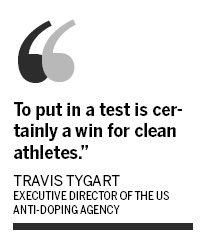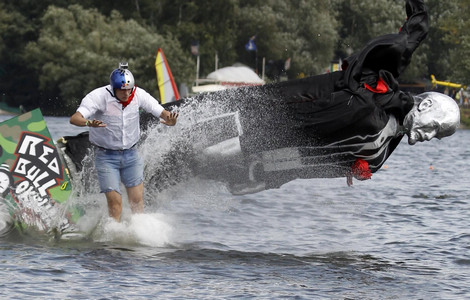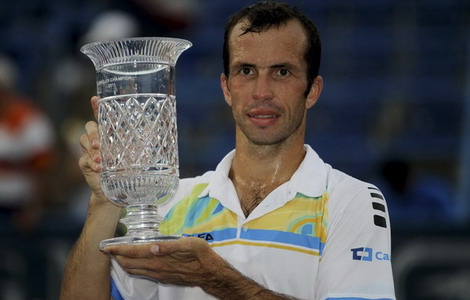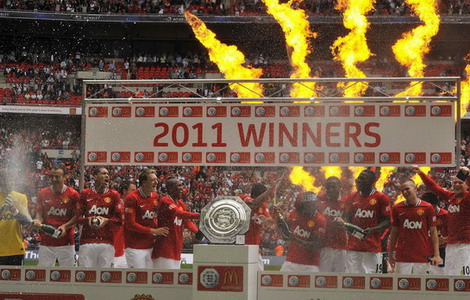Blood tests fail to catch anyone, but are big deal
Updated: 2011-08-08 08:04
(China Daily)
|
|||||||||||

Agreement on regimen, however effectiveness remains questionable
New york - If the initial returns in from Congress are any sign, NFL commissioner Roger Goodell and union chief DeMaurice Smith scored a big hit by agreeing to blood tests for human growth hormone (HGH).
That's important because one of the reasons both pushed for HGH testing was to get politicians in the nation's capital off their backs. They seem to have succeeded, with influential California Democrat Henry Waxman quickly weighing in to congratulate all parties involved with a "welcome breakthrough in the campaign to rid sports of the scourge of doping".
I wouldn't go that far because, even with a blood test, the odds of catching anyone using HGH are remote. A player tested after, say, a morning practice would have almost had to shoot himself up just before breakfast to test positive.
But a breakthrough is a breakthrough even if in the near term it's largely a symbolic one. Until Goodell and Smith signed off on their deal no major sport had any plans for blood testing, though baseball has been randomly testing the blood of minor leaguers for the last year or so.
Now the NFL will have it by opening day - or at least Goodell hopes. There are some details still to be cleared up, namely concerns by players about how the tests will be conducted, how many there will be and how appeals will work. Just how they are settled will determine whether blood testing will be an effective deterrent or just a public relations gimmick.
Still, the fact that athletes in the nation's most popular sport agreed to have blood taken from their arm by a needle - there is no urine test for HGH - shows how far the pendulum in drug testing has swung in organized sports.
Those whose mission is to rid sports of performance-enhancing drugs aren't exactly dancing in the streets over the agreement. They still see lots of possible holes drug cheats can run right through.
For now, though, they'll take it.
"To put in a test is certainly a win for clean athletes," said Travis Tygart, executive director of the US Anti-Doping Agency. "How big a win will be the next question once details of how it will be implemented are released."
Goodell and Smith gave little indication what those details would be when they met on Friday in Canton, Ohio, to sign the 300-page collective bargaining agreement that will be in place over the next decade. But it was notable that Smith later told the league-owned NFL Network that blood testing for HGH was necessary for the integrity of the game.
That's a switch from years past, when unions in the major sports almost instinctively resisted drug testing as an invasion of personal rights. Lately, though, a new generation of players brought up in the steroid era has taken over, and those who are clean have come to the conclusion they don't want to be playing against others who have gotten stronger through the aid of modern chemistry.
"You can't have an advantage like that," Cowboys' player representative Jason Witten said this week. "You've got to have an equalizer. I think we've seen in other sports how it's kind of blown up in their face a little bit."
Unfortunately, blood testing for HGH is not the panacea it might first appear to be. There are issues, most notably that the time frame to catch cheaters is very limited.
Indeed, to be caught a player would have to be either very stupid or very unlucky. The test can detect HGH use only within 24 to 72 hours of blood being taken, and the chances of that happening in a random draw would be laughed at by any Vegas bookmaker.
Associate Press
- G7 urges measures to bolster stability, growth
- 100,000 evacuated as Muifa nears
- Xinjiang official vows crackdown on extremists
- China not yet ready to cut oil prices: NDRC
- Copters to inspect Shanghai's highway traffic
- 'Wailing wall' for Japanese down
- Huge tracts of arable land neglected
- School principals found guilty of kickbacks
Hot Topics
Anti-Gay, Giant Panda, Subway, High Speed Train, Coal Mine, High Temperature, Rainstorm, Sino-US, Oil Spill, Zhu Min
Editor's Picks

|

|

|

|

|

|







